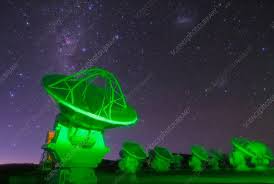Finding Stars but No God
 |
| Google Image |
It included scenes of the famous Atacama Desert, the driest in the world, along the coast of Chile. And that’s the site of the Atacama Large Millimeter/submillimeter Array (ALMA) a collection of 66 radio telescopes, operated by several countries and groups of countries – including the U.S. – to study star birth and planet formation. It’s an impressive array of sophisticated technology, costing $1.4 billion.
I found the presentation fascinating, but I couldn’t help but think of the story in the gospel of Mathew in which Jesus chides the Jewish leaders, noting that they knew how to predict the weather by observing the formation of clouds and the color of the sky but missed recognizing the signs that were important.
The "Easy" Things
“You know how to interpret the appearance of the sky,” he said, “but you cannot interpret the signs of the times.” Jesus may have been referring to the evils of his generation or the coming of the Messiah, who he claimed to be, or both. Ultimately, I believe, he was talking about doing the “easy” things and missing the things that count.
I don’t, of course, apply this quote from Jesus to the scientists in the Atacama, or those who designed or constructed the telescope site let alone the pursuit of science. It’s an analogy on how people today may be adept at technology but blind to what’s ultimately important.
Some would say that failing to find God through science confirms the non-existence of God. Given the nature of God, at least according to Christian theology, you wouldn't expect to find God by use of telescopes. Nonetheless, I believe there are rational reasons for belief and that people who don’t see God’s presence in the universe and among us are missing the obvious.
 |
| Google Image |
Hardy quotes famed theologian and paleontologist Teilhard de Chardin and author Annie Dillard.
“By means of all created things, without exception,” wrote Chardin, “the divine assails us, penetrates us and molds us. We imagine it as distant and inaccessible whereas we are steeped in its burning layers.”
Writes Dillard: “We live in all we seek. The hidden shows up in too-plain sight. It lives captive on the face of the obvious – the people, events, and things of the day – to which we as sophisticated children have long since become oblivious. What a hideout: Holiness lies spread and borne over the surface of time and stuff like color.”
More Than Rationality
What is also obvious is that more than rationality is required to see this reality. In fact, we may need to ask ourselves what it means to be “intelligent.” Our rationality and our emotions are in the same brain, after all, so “brainy” shouldn’t apply only to our rational intelligence but to our relatively recently discovered “emotional intelligence.”
From my limited reading on this subject, this has mostly to do with our relationship skills, so it should also apply to our relationship with “The Other.”
It’s puzzling why so many people ignore the basic questions about life: Why is there something rather than nothing? Does life have meaning or is it an absurdity of meaninglessness? Does God exist and does he/she have anything to do with me?
We’re good at searching for all sorts of things, like answers to questions about the stars, but not answers to these questions. There are answers, using both parts of the brain. But first we need to recognize that the search for God is worth the effort.



Comments
Post a Comment